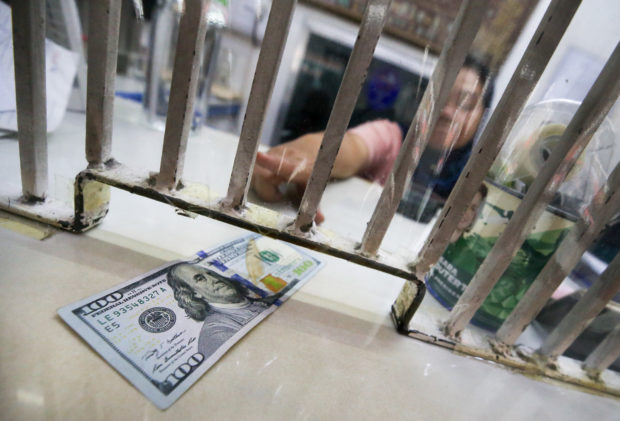Thinning forex reserves put PH rating at risk

FILE PHOTO: An employee at a money exchange shop on A. Mabini Street in Manila accepts a hundred-dollar bill from a customer so it can be converted into pesos. On Monday, June 27, 2022, the Philippine peso again breached the 55:$1 level after more than 16 years. (Photo by LYN RILLON / Philippine Daily Inquirer)
MANILA, Philippines — The Philippines’ investment-grade credit rating could be at risk as the government’s international reserves (GIR), along with those of other economies in Asia-Pacific, have been shrinking over the past several months while the US dollar gained its strongest position against other currencies, at an extent not seen in recent decades.
Fitch Rating said in a statement it observed a steep fall of reserves among the governments in its portfolio, particularly in the seven months to the end of July as normalization of monetary policy or the rise in interest rates in the United States boosted the US dollar.
“Many sovereigns in the region still have substantial reserve buffers, but for a small number, the fall is an indication of mounting external financing stress,” Fitch Ratings said.
Data from the Bangko Sentral ng Pilipinas (BSP) show that its gross international reserves, which was pegged at $108.8 billion at the end of 2021, has receded to $99.84 billion at the end of July 2022.
Steady decline
The BSP’s GIR has been decreasing month after month since registering at $107.8 billion in February and settling at $98.98 billion, based on preliminary data for the end of August.
Yet, the latest GIR number was still above the $88.19 billion that was recorded at the end of February 2020, before COVID-19 was declared a global pandemic on March 12, 2020.
The New York-based credit watcher said reserves in the Asia-Pacific region have fallen by an aggregate of $590 billion in the first seven months of 2022.
“Valuation effects contributed significantly to this trend, as the US currency’s strength has reduced the dollar value of non-US dollar reserve holdings,” the company said.
“We believe that some of the decline also reflects moves by certain regional central banks to support their currencies, offsetting depreciation pressures that might otherwise have added to imported inflation,” it added.
Ample leeway
Last month, BSP Governor Felipe Medalla maintained that the central bank had ample leeway to keep the peso away from a volatile forex market.
Medalla acknowledged that while the BSP does dip into its reserves to intervene in the forex market and prevent the peso from weakening too much, the main recourse to do this was increasing the policy rate.
Since starting policy normalization in May, the regulator had increased its benchmark overnight borrowing rate by a total of 1.75 percentage points to 3.75 percent.
According to Fitch Ratings, from January to July, the largest decline of reserves in the region were observed in China, Singapore and Japan.
Fitch Ratings added that they do not view the use of reserves to smoothen excessive exchange-rate volatility as challenging creditworthiness.
“However, should the regional decline in reserves be sustained, this would eventually put downward pressure on ratings for some [Asia-Pacific] sovereigns,” it said.
“This risk could be significant where reserves have been a rating strength that offsets other credit weaknesses, such as in the Philippines,” it added.
Fitch affirmed in February the country’s investment-grade BBB rating, but with a “negative” outlook, reflecting uncertainties in medium-term growth prospects.